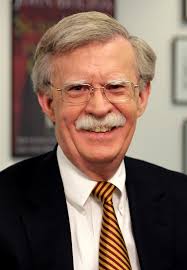John Bolton: A Controversial Figure in U.S. Diplomacy

Introduction
John Bolton, a prominent American attorney, diplomat, and former national security advisor, has been a significant player in U.S. foreign policy for decades. His tenure in various key positions has made him a polarising figure, garnering both staunch supporters and vehement critics. Understanding Bolton’s impact is crucial, especially in light of current global tensions and the United States’ role on the world stage.
Career Overview
Bolton’s political career began in the 1980s, working under President Ronald Reagan’s administration at the U.S. Agency for International Development. He later held positions during the George W. Bush administration, including Assistant Secretary of State for Arms Control and National Security Advisor from 2018 to 2019.
His approach to foreign relations is marked by a hawkish stance, advocating for strong military action and a reduction of diplomatic engagement with countries like Iran and North Korea. Bolton has persistently expressed his belief in the necessity of U.S. strength and interventionism, shaping policies focused on national sovereignty over multilateral cooperation.
Recent Developments
Since leaving the Trump administration, Bolton has remained active in political discourse. He has taken to various media platforms to critique current policies and offer insights into emerging global threats. His recent book, ‘The Room Where It Happened’, recounts his experiences in the White House and provides a behind-the-scenes look at the administration’s decision-making processes. The book has sparked discussions about the ethical implications of loyalty versus honesty in governance.
Moreover, Bolton has been vocal about his concerns regarding current U.S.-China relations and the implications for global security. His warnings about the dangers of appeasement have resonated in an increasingly volatile international landscape as tensions rise over issues like trade, cybersecurity, and military presence in the South China Sea.
Conclusion
John Bolton remains a controversial yet influential figure in the realm of U.S. diplomacy. His hardline tactics and approach to international relations raise crucial questions about the future of American foreign policy. As the world grapples with new threats and challenges, Bolton’s perspectives will likely remain pivotal in shaping the conversation around national security and international commitments. For readers, understanding Bolton’s influence provides context to the ongoing debates that could have far-reaching consequences for U.S. relations globally.









